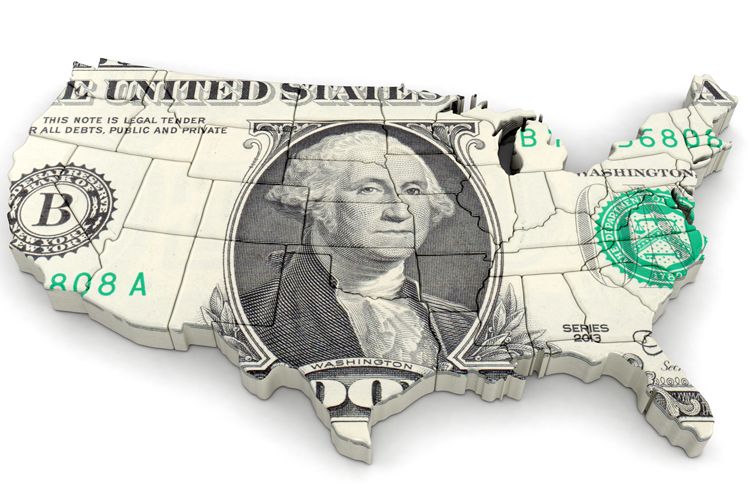State-By-State Estate And Inheritance Tax Rates
Some states have inheritance tax, some have estate tax, one has both, some have none at all. See where your state shows up on the board.

As of 2026, if a person who dies leaves behind an estate that exceeds $15 million the executor must file a federal estate tax return within 9 months and pay a maximum of 40 percent of any assets over that threshold. For example: If an estate is worth $16 million, $1 million is taxed at the federal level.
While the tax rate has remained the same over the years, back in 2017 the exclusion amount was $5.49 million before doubling to $11.2 million in 2018. The current amount increased from $13.99 million in 2025 and will be adjusted annually for inflation starting in 2027.
Now that the federal threshold is much higher, what does this mean for you? Probably nothing. If you have this much money you probably already created a Trust to protect it (or at least you should have… or need to right now). If you don't then it's a fun fact to bring up at your next party, assuming the other partygoers are interested in talking about estate and inheritance taxes. (And who doesn't?)
But the rates, or the very existence, of estate or inheritance tax within specific states varies wildly. Here's the difference between estate and inheritance tax:
- Estate taxes are based on the value of the deceased's property, only apply if the estate exceeds the exemption, and are paid before the money is distributed to heirs.
- Inheritance taxes are paid by the person receiving the property and vary depending on how the heir was related to the deceased (example: spouse, child, cousin, etc...)
Only 12 states (and the District of Columbia) possess estate tax, and five have an inheritance tax. One state boasts both. (Way to go, Maryland.) If you live in one of these states, it's in your best interest to speak with an estate attorney or financial advisor to understand the scope of the taxes and what you can do to mitigate them, especially if you live in a state with inheritance tax. Some of those states have no exemption threshold and it all depends on who's inheriting what (example: a spouse or child might have a lower tax rate than a cousin or friend).
See what your state has to offer in terms of estate or inheritance taxes below.
Alabama: No estate tax or inheritance tax
Alaska: No estate tax or inheritance tax
Arizona: No estate tax or inheritance tax
Arkansas: No estate tax or inheritance tax
California: No estate tax or inheritance tax
Colorado: No estate tax or inheritance tax
Connecticut: The top estate tax rate is 12 percent and is capped at $15 million
Delaware: No estate tax or inheritance tax
Florida: No estate tax or inheritance tax
Georgia: No estate tax or inheritance tax
Hawaii: The top estate tax rate is 20 percent (exemption threshold: $5.49 million)
Idaho: No estate tax or inheritance tax
Illinois: The top estate tax rate is 16 percent (exemption threshold: $4 million)
Indiana: No estate tax or inheritance tax
Iowa: The top inheritance tax rate is 6 percent (no exemption threshold)
Kansas: No estate tax or inheritance tax
Kentucky: The top inheritance tax rate is 16 percent
Louisiana: No estate tax or inheritance tax
Maine: The top estate tax rate is 12 percent (exemption threshold: $7 million)
Maryland: The top estate tax rate is 16 percent (exemption threshold: $5 million); The top inheritance tax rate is 10 percent (no exemption threshold)
Massachusetts: The top estate tax rate is 16 percent (exemption threshold: $2 million)
Michigan: No estate tax or inheritance tax
Minnesota: The top estate tax rate is 16 percent (exemption threshold: $3 million)
Mississippi: No estate tax or inheritance tax
Missouri: No estate tax or inheritance tax
Montana: No estate tax or inheritance tax
Nebraska: The top inheritance tax rate is 18 percent
Nevada: No estate tax or inheritance tax
New Hampshire: No estate tax or inheritance tax
New Jersey: The top inheritance tax rate is 16 percent (no exemption threshold)
New Mexico: No estate tax or inheritance tax
New York: The top estate tax rate is 16 percent (exemption threshold: $7.35 million)
North Carolina: No estate tax or inheritance tax
North Dakota: No estate tax or inheritance tax
Ohio: No estate tax or inheritance tax
Oklahoma: No estate tax or inheritance tax
Oregon: The top estate tax rate is 16 percent (exemption threshold: $1 million)
Pennsylvania: The top inheritance tax rate is 15 percent (no exemption threshold)
Rhode Island: The top estate tax rate is 16 percent (exemption threshold: $1.5 million)
South Carolina: No estate tax or inheritance tax
South Dakota: No estate tax or inheritance tax
Tennessee: No estate tax or inheritance tax
Texas: No estate tax or inheritance tax
Utah: No estate tax or inheritance tax
Vermont: The top estate tax rate is 16 percent (exemption threshold: $2.75 million)
Virginia: No estate tax or inheritance tax
Washington: The top estate tax rate is 20 percent (exemption threshold: $2.129 million)
Washington DC (District of Columbia): The top estate tax rate is 16 percent (exemption threshold: $4,988,400)
West Virginia: No estate tax or inheritance tax
Wisconsin: No estate tax or inheritance tax
Wyoming: No estate tax or inheritance tax
- Trusts Cheat SheetTrust us when we say this is as basic as we can make Trusts.Read more
- All You Need To Know About Advance DirectivesWhen you can’t make health decisions for yourself, this is the north star...Read more
- How To Create A Do Not Resuscitate Order (DNR)A DNR is a medical order that states you don't want cardiopulmonary...Read more
- How Organ Donation WorksIf the person who died was a registered organ donor, measures will be taken...Read more



